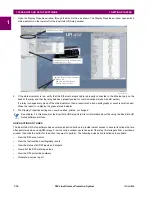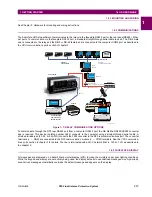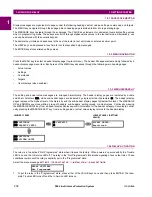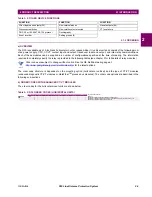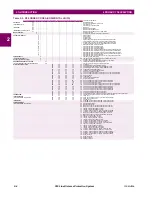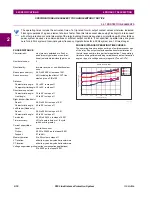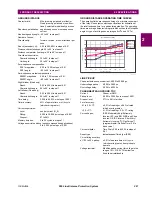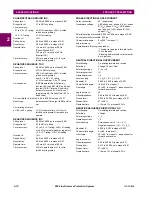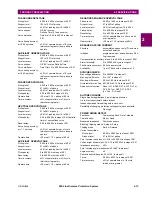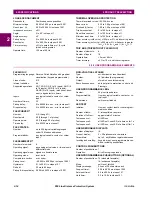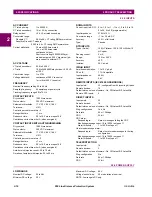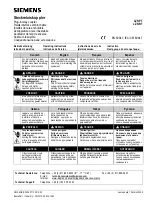
GE Multilin
D30 Line Distance Protection System
2-1
2 PRODUCT DESCRIPTION
2.1 INTRODUCTION
2
2 PRODUCT DESCRIPTION 2.1INTRODUCTION
2.1.1 OVERVIEW
The D30 Line Distance Protection System is a microprocessor-based relay intended for use on transmission lines of any
voltage level, without, with, and in the vicinity of series compensation, in three-pole tripping applications. The primary func-
tion of the relay consists of five phase and ground distance zones of protection, either mho or quadrilateral as per user
selection. The distance elements are optimized to provide good measurement accuracy with a fast operating time, even
when used with capacitive voltage transformers, and can be supervised by detection of power swings. The relay also pro-
vides directional ground overcurrent elements, which are commonly used as part of an overall line protection system.
D30 phase distance zones can be configured to work with voltages and currents fed from VTs and CTs located indepen-
dently from one another on either side of a three-phase power transformer. The relay compensates accordingly to preserve
reach and correct target information regardless of the location and type of fault. This feature allows backup protection appli-
cations for generators and power transformers.
A close-into-fault (or switch-on-to-fault) function is performed by the line pickup element. Out-of-step tripping, three-pole
autoreclosing, synchrocheck, fault location, and many other functions are also available. In addition, overcurrent and
undervoltage protection, fault diagnostics, power metering, and RTU functions are provided. The D30 provides phase, neu-
tral, and ground time overcurrent protection. The time overcurrent functions can be programmed with multiple curve shapes
or FlexCurve™ for optimum coordination.
Voltage, current, and power metering is built into the relay as a standard feature. Current parameters are available as total
waveform RMS magnitude, or as fundamental frequency only RMS magnitude and angle (phasor).
Diagnostic features include an event recorder capable of storing 1024 time-tagged events, oscillography capable of storing
up to 64 records with programmable trigger, content and sampling rate, and data logger acquisition of up to 16 channels,
with programmable content and sampling rate. The internal clock used for time-tagging can be synchronized with an IRIG-
B signal, using the Simple Network Time Protocol (SNTP) over the Ethernet port, or using the Precision Time Protocol
(PTP). This precise time stamping allows the sequence of events to be determined throughout the system. Events can also
be programmed (via FlexLogic™ equations) to trigger oscillography data capture which may be set to record the measured
parameters before and after the event for viewing on a personal computer (PC). These tools significantly reduce trouble-
shooting time and simplify report generation in the event of a system fault.
Several options are available for communication. A faceplate RS232 port can be used to connect to a computer for the pro-
gramming of settings and the monitoring of actual values. The RS232 port has a fixed baud rate of 19.2 kbps. The rear
RS485 port allows independent access by operating and engineering staff. It can be connected to system computers with
baud rates up to 115.2 kbps. All serial ports use the Modbus RTU protocol. The 100Base-FX or 100Base-T Ethernet inter-
face provides fast, reliable communications in noisy environments. The Ethernet port supports IEC 61850, Modbus/TCP,
and TFTP protocols, PTP (according to IEEE Std. 1588-2008 or IEC 61588), and allows access to the relay via any stan-
dard web browser (D30 web pages). The IEC 60870-5-104 protocol is supported on the Ethernet port, and DNP 3.0 and
IEC 60870-5-104 cannot be enabled at the same time. The Ethernet port also supports the Parallel Redundancy Protocol
(PRP) of IEC 62439-3 (clause 4, 2012) when purchased as an option.
Settings and actual values can be accessed from the front panel or EnerVista software.
The D30 IEDs use flash memory technology which allows field upgrading as new features are added. The following single
line diagram illustrates the relay functionality using ANSI (American National Standards Institute) device numbers.
Summary of Contents for D30D00HCHF8AH6AM6BP8BX7A
Page 10: ...x D30 Line Distance Protection System GE Multilin TABLE OF CONTENTS...
Page 374: ...5 248 D30 Line Distance Protection System GE Multilin 5 10 TESTING 5 SETTINGS 5...
Page 398: ...6 24 D30 Line Distance Protection System GE Multilin 6 5 PRODUCT INFORMATION 6 ACTUAL VALUES 6...
Page 410: ...7 12 D30 Line Distance Protection System GE Multilin 7 2 TARGETS 7 COMMANDS AND TARGETS 7...
Page 444: ...9 24 D30 Line Distance Protection System GE Multilin 9 5 FAULT LOCATOR 9 THEORY OF OPERATION 9...
Page 576: ...B 102 D30 Line Distance Protection System GE Multilin B 4 MEMORY MAPPING APPENDIX B B...
Page 616: ...D 10 D30 Line Distance Protection System GE Multilin D 1 IEC 60870 5 104 PROTOCOL APPENDIX D D...
Page 628: ...E 12 D30 Line Distance Protection System GE Multilin E 2 DNP POINT LISTS APPENDIX E E...
Page 636: ...F 8 D30 Line Distance Protection System GE Multilin F 3 WARRANTY APPENDIX F F...
Page 646: ...x D30 Line Distance Protection System GE Multilin INDEX...










